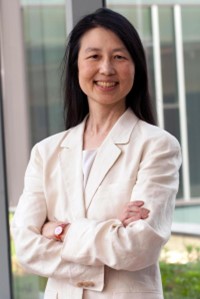Biography
 Link to
Wikipedia
Link to
Wikipedia
Figure 1:photo of Jeannette M. Wing.
Jeannette Marie Wing is a Chinese-American computer scientist. Born in Canada and later a U.S. citizen, she received her B.S. and M.S. degrees from the Massachusetts Institute of Technology (MIT) in 1979 and her Ph.D. from MIT in 1983. D. from MIT in 1983 and became the first Chinese-American female vice president in the history of Columbia University in 2021. She received the ACM Distinguished Contribution Award and the ACM Women's Achievement Award, which demonstrated her outstanding contributions to computer science.
The concept of computational thinking was first introduced and defined in her article "Computational Thinking", published in ACM in 2006. Thinking like a computer scientist requires not only the ability to program but also to think at multiple levels of abstraction (Wing, 2006). This article has helped other researchers better understand how to teach computer science, including how to teach programming, algorithms, and problem-solving. Furthermore, this way of thinking has suggested that it can be introduced to play a role in the education of different disciplines. The introduction of computational thinking has led to extensive discussion and research among computer science scholars, contributing to the development of computer science. In Jeannette Marie Wing's 2011 article, the definition of computational thinking was modified. Computational thinking is a thought process that has to do with formulating a problem and its solution, facilitating a formal representation of the solution that can be effectively executed using information processing (Cansu, F.K. & Cansu, S.K., 2019). Jeannette Marie Wing's argument provided a fresh perspective between humans and computers, kicking off a wave of research into computational thinking (Shute et al., 2017, pp. 142-158). The concept of "Computational Thinking" has also had an impact on educational policy-making.
Jeannette Marie Wing's research work in the areas of formal methods, programming languages, security, privacy, and distributed systems has led to significant achievements. It has been instrumental in improving the reliability and security of computer systems position and her emphasis on interdisciplinary applications. This has made her a prominent figure and role model in the field of computer science. She has had a profound impact on the advancement and popularisation of computer science.